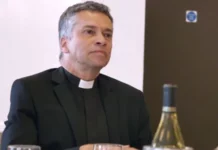The Christian Institute has launched a suite of resources for church leaders to understand and confront the dangers of Critical Theory – the lethal blend of postmodernism and Marxist ideology behind ‘woke activism’ and ‘cancel culture’.
Critical Theory (CT) contrives to divide society into ‘the privileged’ and ‘the oppressed’, and is foundational to many of the identity challenges facing the Church and society today.
In a new booklet titled Critical Theory: Challenging Truth and Reality, author and conference speaker Dr Sharon James explains how CT’s assumption that there is no transcendent God leads to an all-out assault on reality. She considers its impact on the Church and how Christians should respond.
After an overview of CT from its foundation in Germany in 1923 at a Marxist study centre, Dr James explains how over the decades, a distinction emerged between ‘traditional theory’ and ‘critical theory’. Traditional theory, including science, history and philosophy, seeks to understand the world ‘as it is’. Critical theory is not about understanding the world, but about changing it – getting society to where it ‘should be’ – by overturning all institutions which ‘prop up’ the status quo.
The aim, she explains is to “overthrow structures by spreading suspicion, mistrust and division, and to encourage people to view all authority as oppressive, and all truth claims as suspicious”.
Dr James has a stark warning for the Church. She believes many Christians confuse groups promoting ‘Social Justice’ with biblical justice. But ‘Social Justice’, she warns, is a tool of CT: “The single most powerful strategy adopted by the architects of Critical Theory was to hijack the word ‘justice’, and subvert its true meaning. As Christians we must oppose injustice. But hijacking the language of justice has deceived many in the Church into going along with the various critical theories which are destabilising society by dividing us into competing groups.”
The academic says there are three manifestations of CT which increasingly threaten the UK:
Critical Gender Theory: Christian tradition and the Bible is regarded as being infused with sexism. CT’s aim is to destroy complementary male-female differences. If there is no creator God, and everything is socially constructed, then gender itself can be viewed as a social construct. If it is socially constructed, it can be deconstructed too.
Critical Legal Theory: Traditional ideas of ‘equality before the law’ are regarded by CT as a tool for the privileged to keep victims oppressed. CT sees the law as a means to compensate oppressed groups for past and present wrongs.
Critical Race Theory: Racism is a sin. We are all made in the image of God, and the Christian view is that we should treat people with equal dignity and respect. But CT advocates say treating people equally, whatever the colour of their skin, is dangerous. They view ‘colour blindness’ as racist.
In a closing chapter outlining the impact on the UK Church, Dr James warns that under the cover of ‘social justice’, CT has been smuggled into all the major institutions of the West.
She explains: “Critical Theory teaches us to assume that claims to absolute morality are offensive. Biblical morality is regarded as inflicting harm just as severe as physical violence, maybe even more severe. Teaching on biblical repentance can offend people. Hence the demands for a wide-ranging ban on so-called ‘conversion therapy’.”
She continues: “Critical Theory also presents a false gospel. It has a false view of humanity. The Bible teaches we are all equally created in God’s image. Critical Theory sees us in terms of our group identity.”
In publishing Dr James’s work, The Christian Institute hopes that the UK Church will respond positively in an age of confusion. Ciarán Kelly, Deputy Director at the Institute, added: “Dr James has provided a valuable range of resources for churches to engage with this key issue of the day. Her message is clear: don’t be taken in by the claim that we should use Critical Theory as a ‘useful tool’ – embrace biblical ethics, live out Christ-like care, and above all, be confident in God’s good purposes!”
The 48-page Critical Theory: Challenging Truth and Reality is part of a suite of new, free and downloadable resources, including:
• Critical Theory – a six-page leaflet touching upon the origins and development of Critical Theory and its impact on the Church.
• A four-part video series (also available as a podcast):
- Are feelings more important than facts?;
- Confronting Critical Theory;
- Non-Christian responses to Critical Theory;and,
- Christian responses to Critical Theory.
Download online at: Critical Theory – The Christian Institute



